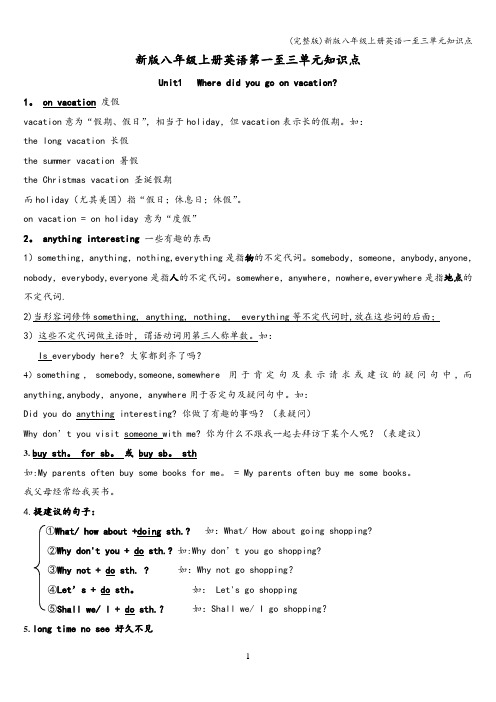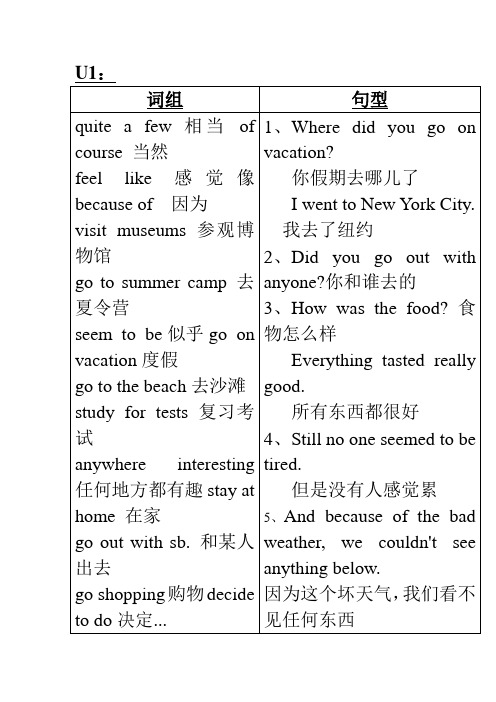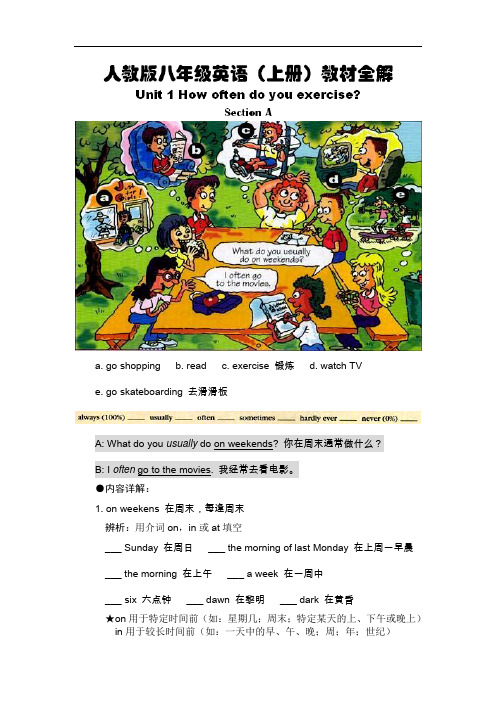新版人教版英语八年级上册U1-U3
人教版八年级上Unit1 Unit3音标及单词

Unit1 Where did you go on vacation?∙anyone ['eniwʌn] pron.任何人∙anywhere ['eniweə(r)] adv.在任何地方 n.任何(一个)地方∙wonderful ['wʌndəfl] adj.精彩的;极好的∙few [fjuː] adj.& pron.不多;很少的;n.少量∙quite a few 相当多;不少∙most [məʊst] adj.,adv.& pron.最多;大多数∙something ['sʌmθɪŋ] pron.某事;某物∙nothing(=not…anything) ['nʌθɪŋ] pron.没有什么;没有一件东西∙everyone ['evriwʌn] pron.每人;人人;所有∙of course [kɔ:(r)s]当然;自然∙myself [maɪ'self] pron.我自己;我本人∙yourself [jɔː'self] pron.(pl.yourselves [jɔ: (r)' selvz)你自己;你亲自∙hen [hen] n.母鸡;雌禽∙pig [pɪg]n.猪∙seem [siːm] vi.似乎;好像∙bored [bɔːd] adj.厌倦的;烦闷的∙someone ['sʌmwʌn] pron.某人;有人∙diary ['daɪəri] n.日记;日记簿(keep a diary)∙enjoyable [ɪnˈdʒɔɪəbl] adj.有乐趣的;令人愉快的∙activity [æk'tɪvəti] n.活动;活跃∙decide [dɪ'saɪd] v.决定;选定(decide to do sth.)∙try [traɪ] v.&n.尝试;设法;努力 (try to do sth. /try doing sth.) ∙paragliding ['pærəɡlaɪdɪŋ] n.空中滑翔跳伞∙feel like给……的感觉;感受到∙bird [bɜː(r)d] n.鸟;禽∙bicycle ['baɪsɪkl] n.自行车;脚踏车∙building ['bɪldɪŋ] n.建筑物;房子∙trader ['treɪdə(r)] n.商人;商船∙wonder ['wʌndə(r)] v.惊奇;想知道;怀疑∙difference ['dɪfrəns] n.差异;不同∙top [tɒp] n.顶部;表面∙wait [weɪt] v.等候;等待(wait for)∙umbrella [ʌm'brelə] n.伞;雨伞∙wet [wet] adj.湿的;潮湿的;下雨的∙because of因为∙below [bɪ'ləʊ] prep.&adv.低于;在...下面;到……下面∙enough [ɪ'nʌf] adj.足够的adv.足够地;充分地∙hungry(反full) ['hʌŋɡri] adj.饥饿的;渴望的∙as [əz] conj.如同;像...一样∙hill [hɪl] n.小山;小丘∙duck [dʌk] n.鸭肉;鸭∙dislike [dɪs'laɪk] v.不喜欢;厌恶 n.不喜爱;厌恶;反感∙Central Park 中央公园(美国纽约)∙Huangguoshu Waterfalls ['wɔtə:,fɔls]黄果树瀑布(贵州)∙Hong Kong/'hɔŋ'kɔŋ/香港(中华人民共和国特别行政区)∙Malaysia [mə'leɪʒə]马来西亚∙Malaysian[mə'leɪʒn]马来西亚的n.马来西亚人∙Georgetown['dʒɔdʒtaun]乔治市(马来西亚)∙Weld[weld]Quay[kiː]海墘街∙Penang[pɪ'næŋ]槟城山(马来西亚)∙Tian'anmen Square天安门广场∙the Palace Museum故宫博物院∙Mark[mɑ:k]马克(男名)Unit3 I'm more outgoing than my sister.∙outgoing ['aʊtɡəʊɪŋ] adj.外向的;爱交际的;有好的∙both [bəʊθ] adj.两者都pron.两者∙better ['betə(r)] adj.更好的;较好的 adv.更好地∙loudly ['laʊdli] adv.大声地;高声地;花俏地∙quietly ['kwaɪətli] adv.安静地;悄悄地;平静地∙hard-working [hɑːd'wɜːkɪŋ] adj.勤勉的;努力工作的∙competition [ˌkɒmpə'tɪʃn] n.竞争;比赛∙fantastic [fæn'tæstɪk] adj.极好的;了不起的∙which adj.哪一个;哪一些pron.哪一个;哪些∙clearly ['klɪəli] adv.清楚地;显然地∙win [wɪn] v.赢;赢得;获胜;获得n.胜利∙though conj.虽然;尽管;adv.不过∙talented ['tæləntɪd] adj.有才能的;有天赋的∙truly ['truːli] adv.真实地;真诚地;正确地∙care [keə(r)] v.关心;担忧;照顾;在乎∙care about v.关心;在意∙serious ['sɪəriəs] adj.严肃的;严重的;庄重的∙mirror ['mɪrə(r)] n.镜子;反映∙kid [kɪd] n.小孩;年轻人∙as long as只要;既然∙necessary ['nesəsəri] adj.必要的;必然的∙be different from和...不同∙bring out使显现;使表现出∙grade [greɪd] n.成绩等级;评分等级∙should [ʃʊd;ʃəd] aux.应该;可能;应当;将要∙the same as与...同样的∙saying ['seɪɪŋ] n.谚语;格言;警句∙reach [riːtʃ] v.到达;伸出;达成;取得联系;延伸;(伸手)去够∙hand [hænd] n.手∙touch [tʌtʃ] vt.触摸;感动∙heart [hɑːt] n.心脏;内心∙fact [fækt] n.事实;真相;实际∙in fact事实上;实际上;确切地说∙break [breɪk] v.打碎;折断;违背;解决;中断∙arm [ɑ:m] n.手臂上肢∙share [ʃeə(r)] vt.分享,共享;分配;共有∙loud [laʊd] adj.大声的;adv.大声地;响亮地∙similar ['sɪmələ(r)] adj.类似的∙be similar to类似于;与...相似∙primary ['praɪməri] adj.最初的,最早的∙primary school小学∙laugh [lɑːf] v.发笑;笑;嘲笑 n.笑声;笑;笑料∙information [ɪnfə'meɪʃ(ə)n] n.信息;情报;资料;通知∙ Tara[tə'rɑː]塔拉(女名)∙Sam [sæm]萨姆(男名)∙Nelly['nelɪ]内莉(女名)∙Larry'[lærɪ]拉里(男名)。
人教版八年级上册英语Unit 1-Unit 3复习课件(共80张PPT)

(2)During sunrise he would take a break and climb up on the fence(篱笆) along the side of the farm. 休息 (3)In 2004,he won the first Olympic gold medal for China in the 110m hurdles race,and at the same time broke the Olympic Games record.(外研九上 Module 8) 打破(纪录)
4.result
熟义:n.结果;后果 生义:v.(因……而)产生;发生 n.成绩;得分
(1)I like math and I dream of achieving good research results like the top scientists.(2020·湖南郴 州) 结果 (2)How can the boy know his test results? 成 绩
8.grade
熟义:n.成绩等级;评分等级;(美国学制)年级 生义:n.等级;品级 v.划分等级;给……评分
(1)I am not telling you not to study—You still should, but you can try studying less if it doesn’t influence your grades.(2020·辽宁抚顺) 成绩等级 (2)Most teachers at that time thought this new letter grading system was an easy,fair and clear way to grade students.(2018·北京) 给……评分
(完整版)新版八年级上册英语一至三单元知识点

新版八年级上册英语第一至三单元知识点Unit1 Where did you go on vacation?1。
on vacation度假vacation意为“假期、假日”,相当于holiday,但vacation表示长的假期。
如:the long vacation 长假the summer vacation 暑假the Christmas vacation 圣诞假期而holiday(尤其美国)指“假日;休息日;休假”。
on vacation = on holiday 意为“度假”2。
anything interesting 一些有趣的东西1)something,anything,nothing,everything是指物的不定代词。
somebody,someone,anybody,anyone,nobody,everybody,everyone是指人的不定代词。
somewhere,anywhere,nowhere,everywhere是指地点的不定代词.2)当形容词修饰something, anything, nothing, everything等不定代词时,放在这些词的后面;3)这些不定代词做主语时,谓语动词用第三人称单数。
如:Is everybody here? 大家都到齐了吗?4)something,somebody,someone,somewhere用于肯定句及表示请求或建议的疑问句中,而anything,anybody,anyone,anywhere用于否定句及疑问句中。
如:Did you do anything interesting? 你做了有趣的事吗?(表疑问)Why don’t you visit someone with me? 你为什么不跟我一起去拜访下某个人呢?(表建议)3.buy sth。
for sb。
或 buy sb。
sth如:My parents often buy some books for me。
人教新目标版八年级英语上册1-3单元知识点汇总

人教新目标版八年级英语上册1-3单元知识点汇总1.复合不定代词构成:由some,any,everyone,no加上one,body,thing构成的不定代词称为复合不定代词。
具体见下表:2.用法:There is someone outside the door.门外有个人。
I don't have anything to say today.我今天没有任何事想说。
Money isn't everything.金钱不是所有。
3.复合不定代词被形容词修饰时,形容词要放在复合不定代词后面。
这和一般的形容词修饰名词,形容词要放在名词前不一样。
形容词修饰普通名词: There is a beatuiful girl standing under the tree.形容词修饰复合不定代词:I have something important to tell you.There is nothing wrong with radio.4.复合不定代词表示单数概念,做主语时,谓语动词用单数。
Everything begins to grow in spring.5.some_不定代词通常用于肯定句中,而any_不定代词则多用于否定句和疑问句中。
但在表示请求,建议等的疑问句中,一般用some_的不定代词。
Would you like something to drink?Sir,_____ called you just now.I told him to phone again.20minutes later._______Ok.Thanks,Nancy.A.someoneB.nobodyC. anyoneD.everyoneDear classmates,may I have your attention,please? I have _________ to.tell you . Aimportant something B important anything C something important Danything important.1._Do you have ______ to say for yourself?_No,I have ______ to say.A something;everythingB nothing ;somethingC everything;anythingDanything;nothing2._would you like _____ to eat?__Yes,please.A somethingB anythingC some thingsD any things3.Water is important to ________,so there are many water festivals around the world.A everyoneB nobody Csomebody D something二.一般过去时的规则动词与不规则动词1.规则动词过去式的构成和发音2.不规则动词的过去式的变化各异。
人教版八年级英语上册一至三单元教案(全).doc

Unit 1 Where did you go on vacation?第一课时Section A 1 (la-2d)一、教学目标:1.语言知识目标:1)能掌握以下单-词:anyone, anywhere, wonderful, quite a few, most, something, nothing, everyone, of course, myself; yourself能掌握以下句型:①一Where did you go on vacation? 一I went to the mountains.②一Where did Tina to on vacation? —She went to the beach.③一Did you go with anyone? 一Yes, I did./No, I didn't.2)能了解以下语法:一复合不定代词someone, anyone, something, anything 等的用法。
—yourself, myself等反身代词的用法。
3)一般过去时态的特殊疑问句,一般疑问句及其肯定、否定回答。
2 •情感态度价值观目标:学会用一般过去时进行信息交流,培养学生的环保意识,热爱大自然。
二、教学重难点1.教学重点:1)用所学的功能语言交流假期去了什么旅行。
2)拿握木课时出现的新词汇。
2.教学难点:1)复合不定代词someone, anyone, something, anything 等的用法。
2)yourself, myself等反身代词的用法。
三、教学过程I・ Lead-in1.看动画片来进入本课时的主题谈论上周末做了些什么事情,谈论过去发生的事情。
II・ Presentation1.Show some pictures on the big screen. Let Ss read the expressions.2.Focus attention on the picture. Ask: What can you see? Say: Each picture shows something a person did in the past. Name each activity and ask students to repeat: Stayed at home, Went to mountains, went to New York City 6. Went to the beach, visited my uncle, visited museums, went to summer camp3.Now, please match each phrase with one of the pictures next to the name of the activity, point to the sample answer.4.Check the answers・ Answers: 1. f 2. b 3. g 4. e5. c6. a7. dIII.Listening1.Point to the picture on the screen.Say: Look at the picture A. Where did Tina go on vacation? She went to mountains.Ask: What did the person do in each picture?2.Play the recording the first time.3.Play the recording a second time.Say: There are three conversations- The people talk about what did on vacation. Listen to the recording and write numbers of the names in the right boxes of the picture.4.Check the answers ・IV.Pair work1.Point out the sample conversation. Ask two Ss to read the conversation to the class・2.Now work with a partne匚Make your own conversation about the people in the picture.3.Ss work in pairs. As they talk, move around the classroom and give any help they need.4.Let some pairs act out their conversations・V.Listening1.Tell Ss they will hear a conversation about three students' conversations. Listen for the first time and fill in the chart・ Then listen again and check Yes, or No.2.Let Ss read the phrases in the chart of 2b.3.Play the recording the first time. Ss listen and fill in the chart•4.Play the recording a second time for the Ss to check "Yes, I did/5 or "No, I didn't."5.Check the answers with the Ss.VI> Pair work1. Let two Ss read the conversation between Grace, Kevin and Julie ・2. Let Ss work in pairs and try to role-play the conversation.3. Ask some pairs to act out their conversations.VII. Role-play1. First let Ss read the conversation and match the people and places they went.2. Let Ss act out the conversations in pairs.3. Some explanations in 2d.Homework:用英语询问你的一位好朋友,她(他)假期去了哪里?看到了什么?并将此对话 写在作业上。
新版人教版英语八年级上册U1-U3

U1:词组句型quite a few 相当of course 当然feel like感觉像because of 因为visit museums 参观博物馆go to summer camp 去夏令营seem to be似乎go on vacation度假go to the beach去沙滩study for tests 复习考试anywhere interesting 任何地方都有趣stay at home 在家go out with sb. 和某人出去go shopping购物decide to do决定... 1、Where did you go on vacation?你假期去哪儿了I went to New York City. 我去了纽约2、Did you go out with anyone?你和谁去的3、How was the food? 食物怎么样Everything tasted really good.所有东西都很好4、Still no one seemed to be tired.但是没有人感觉累5、And because of the bad weather, we couldn't see anything below.因为这个坏天气,我们看不见任何东西U2:词组句型how often多久hardly ever几乎不at least至少swing dance摇摆舞junk food垃圾食品such as像how many多少less than少于go online上网be good for 对...好more than 多于watch TV看电视1、What do you usually do on weekends?你通常在周末干什么I always exercise.我经常锻炼2、I often help with housework.我经常帮做家务3、It's good for my health.这个对身体好4、Although many students like to watch sports,gamego to the dentist去看牙医use the Internet上网a lot of good habits很多好习惯shows are the most popular. 更多学生看运动节目,娱乐节目5、How often does he watch TV?Hardly ever.他多久看一次电视?几乎不U3:词组句型which one哪一个care about 关心have fun有趣primary school小学as long as只要bring out 取出in fact事实上the same as相同的make sb. laugh逗某人笑be similar to类似get better grades有好成绩share everything分享一切be different from和...不同play the drums打鼓more hard-working工作更努力1、Is Tom smarter than Sam?Tom比Sam聪明吗?No.不2、Are you as friendly as Tina?你和Tina一样友好吗3、You don't need a lot of friends as long as they're good.朋友不在多,贵在好4、A true friend reaches for your hand and touches your heart.一个真正的朋友,可以伸出援助之手,感动你5、It's not necessary to be the same.没有必要一样。
最新人教版八年级英语(上)教材全解Unit1-3名师优秀教案

a. go shoppingb. readc. exercise 锻炼d. watch TVe. go skateboarding 去滑滑板●内容详解:1. on weekens 在周末,每逢周末辨析:用介词on,in或at填空___ Sunday 在周日___ the morning of last Monday 在上周一早晨___ the morning 在上午___ a week 在一周中___ six 六点钟___ dawn 在黎明___ dark 在黄昏★on用于特定时间前(如:星期几;周末;特定某天的上、下午或晚上)in用于较长时间前(如:一天中的早、午、晚;周;年;世纪)at用于具体时刻(如:点钟、黎明、黄昏、午夜midnight)★答案:on;on;in;in;at;at;at2. go to the movies 去看电影★其他说法:go to the cinema和go to see a film3.句型:What+助动词(do/does)+sb.+do?Sb.+频率副词+do/does sth.★一般现在时表示经常性、习惯性的动作或存在的状态。
主句是非第三人称单数时,谓语动词用原形;主语是第三人称单数时,谓语动词要在词尾加-s或-es。
例句:A: What does she usually do on weekends?B: She often goes to the movies.请将以下句子翻译成英语:小明周末通常做什么?他经常在周末打篮球。
她总是在周末购物。
张强很少在周末锻炼。
我有时在周末读书。
他从来不在星期一看电视。
答案:What does Xiao Ming usually do on weekends?He often plays basketball on weekends.She always goes shopping on weekends.Zhang Qiang hardly ever exercises on weekends.I sometimes read on weekends. / I read on weekends sometimes. /Sometimes I read on weekends.He never watches TV on Monday.4.频率副词:表示频率的副词(短语)通常用于一般现在时或一般过去时(过去的某段时间里做某事的频率)的句子里,频率副词(短语)常放在行为动词之前,系动词、情态动词或助动词之后。
2022人教新目标八年级上册英语Unit 1--3知识点+同步练习

Unit 1 Where did you go on vacation? 短语:go on vacation visit museums go outof course walk around find out stay at homego to summer campmost of the timefeel liketoo manygo ongo to the mountainsquite a fewcome upgo shoppingbecause oftake photosgo to the beachstudy forhave a good timein the pastone bowl ofsomething important语法:Where did you go on vacation?I went to New York City.Did you go out with anyone? No, No one was here. Everyone was on vacation. Did you buy anything special? Yes, I bought something for my father.How was the food? Everything tasted really good.Did everyone have a good time? Oh,yes. Everything was excell ent.惯用法:1. buy sth for ab./ buy sb. sth2. taste + adj.3. nothing ….but4. seem + (to be) + adj5. arrive in / arrive at6. d ecid e to d o sth.7. try d oing sth. / try to d o sth.8. enjoy d oing sth.9. want to d o sth. 10. start d oing sth.11. Stop to d o /d oing sth.12. l ook + adj13. dislike d oing sth.14. Why not d o sth.15. so + adj + that + 从句16. tell sb. (not) to d o sth.17. keep d oing sth.18. forget to do sth. / forget d oing sth用anyone ,something, anything, everything, nothing, everyone , no one 填空。
- 1、下载文档前请自行甄别文档内容的完整性,平台不提供额外的编辑、内容补充、找答案等附加服务。
- 2、"仅部分预览"的文档,不可在线预览部分如存在完整性等问题,可反馈申请退款(可完整预览的文档不适用该条件!)。
- 3、如文档侵犯您的权益,请联系客服反馈,我们会尽快为您处理(人工客服工作时间:9:00-18:30)。
U1:
词组句型
quite a few 相当of course 当然
feel like感觉像because of 因为
visit museums 参观博物馆
go to summer camp 去夏令营
seem to be似乎go on vacation度假
go to the beach去沙滩study for tests 复习考试
anywhere interesting 任何地方都有趣stay at home 在家
go out with sb. 和某人出去
go shopping购物decide to do决定... 1、Where did you go on vacation?
你假期去哪儿了
I went to New York City. 我去了纽约
2、Did you go out with anyone?你和谁去的
3、How was the food? 食物怎么样
Everything tasted really good.
所有东西都很好
4、Still no one seemed to be tired.
但是没有人感觉累
5、And because of the bad weather, we couldn't see anything below.
因为这个坏天气,我们看不见任何东西
U2:
词组句型
how often多久hardly ever几乎不at least至少swing dance摇摆舞junk food垃圾食品such as像
how many多少less than少于
go online上网be good for 对...好more than 多于watch TV看电视1、What do you usually do on weekends?
你通常在周末干什么
I always exercise.我经常锻炼
2、I often help with housework.
我经常帮做家务
3、It's good for my health.这个对身体好
4、Although many students like to watch sports,game
go to the dentist去看牙医
use the Internet上网a lot of good habits很多好习惯shows are the most popular. 更多学生看运动节目,娱乐节目
5、How often does he watch TV?
Hardly ever.他多久看一次电视?几乎不
U3:
词组句型
which one哪一个care about 关心have fun有趣primary school小学as long as只要bring out 取出
in fact事实上the same as相同的make sb. laugh逗某人笑
be similar to类似
get better grades有好成绩
share everything分享一切
be different from和...不同
play the drums打鼓more hard-working工作更努力1、Is Tom smarter than Sam?
Tom比Sam聪明吗?No.不
2、Are you as friendly as Tina?
你和Tina一样友好吗3、You don't need a lot of friends as long as they're good.
朋友不在多,贵在好4、A true friend reaches for your hand and touches your heart.
一个真正的朋友,可以伸出援助之手,感动你
5、It's not necessary to be the same.没有必要一样。
